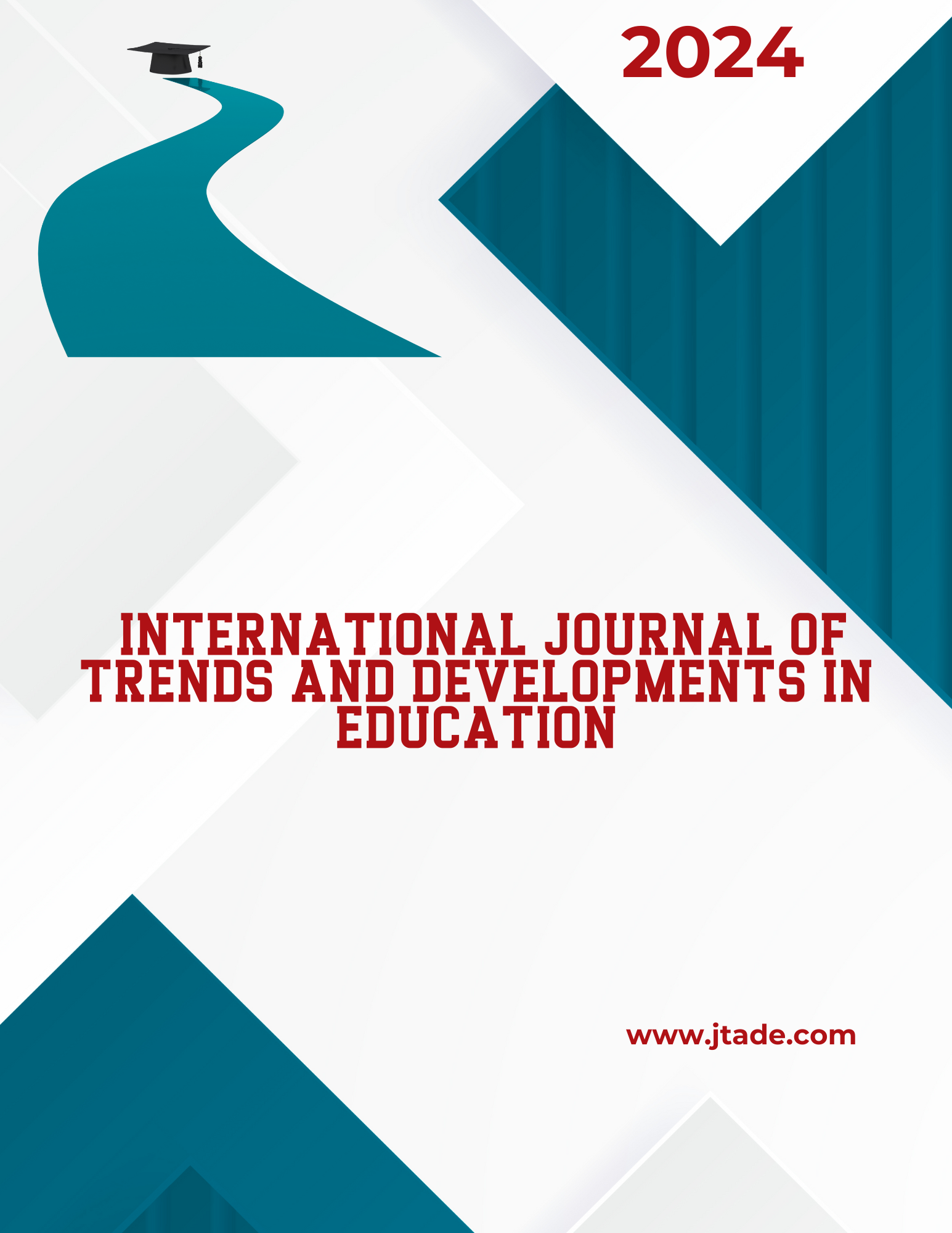Research article | Open Access
International Journal of Trends and Developments in Education 2021, Vol. 1(1) 70-84
The Reflection of Teacher Technology Knowledge On Distance Education
pp. 70 - 84
Publish Date: December 15, 2021 | Single/Total View: 80/146 | Single/Total Download: 87/154
Abstract
The global Covid-19 pandemic affected education as in all areas of our daily life, and the distance learning process in education started with the necessary precautions in this field. Especially the use of online education technologies has provided a solution in this area for restarting and maintaining education, which was suspended for a while due to the pandemic. This study aims to reveal how teachers' knowledge of technology usage at the secondary education level in distance education activities is reflected in the distance education process. The research was conducted with the case study model, which is one of the qualitative research methods. The study sample consists of 26 teachers working at the secondary education level throughout the city of Gaziantep. The study data were collected as a result of the interviews made in Zoom and WhatsApp applications with the semi-structured interview form created by the researchers as a result of scanning the literature. The collected data were analyzed using descriptive and content analysis. Despite the adverse effects of the pandemic process on education in the research findings, teachers continue their teaching activities by using all the opportunities provided by technology and preparing course materials by using educational technologies in this process. In this negative process, they ensure that educational activities continue by sharing these materials with their students.
Keywords: Distance education, Educational technologies, Technology
APA 7th edition
ALTAN, N., DINLER, M.K., & KURKCU, O. (2021). The Reflection of Teacher Technology Knowledge On Distance Education. International Journal of Trends and Developments in Education, 1(1), 70-84.
Harvard
ALTAN, N., DINLER, M. and KURKCU, O. (2021). The Reflection of Teacher Technology Knowledge On Distance Education. International Journal of Trends and Developments in Education, 1(1), pp. 70-84.
Chicago 16th edition
ALTAN, Neslihan, Miyase Kubra DINLER and Oguz KURKCU (2021). "The Reflection of Teacher Technology Knowledge On Distance Education". International Journal of Trends and Developments in Education 1 (1):70-84.
Akkoyunlu, B., & Kurbanoğlu, S. (2003). Öğretmen adaylarının bilgi okuryazarlığı ve bilgisayar öz-yeterlik algıları üzerine bir çalışma. Hacettepe Üniversitesi Eğitim Fakültesi Dergisi, 24 (24).
Aktepe, V. (2011). Sınıf öğretmenlerinin derslerinde bilgisayarı kullanımlarına ilişkin görüşleri. Ahi Evran Üniversitesi Kırşehir Eğitim Fakültesi Dergisi, 12 (3), 75-92.
Aytaçlı, B. (2012). Durum çalışmasına ayrıntılı bir bakış. Adnan Menderes Üniversitesi Eğitim Fakültesi Eğitim Bilimleri Dergisi, 3(1), 1-9.
Baydaş, Ö, Gedik, N., & Göktaş Y. (2013). Öğretmenlerin bilişim teknolojileri kullanımı: 2005- 2011 yıllarının karşılaştırılması, Hacettepe Üniversitesi Eğitim Fakültesi Dergisi, 28(3), 41-54.
Baker, C., Wuest, J., & Stern, P.N. (1992). Methodslurring: thegroundedtheory/ phenomenology example. Journal of Advanced Nursing, 17, 1355-1360
Basilaia, G., & Kvavadze, D. (2020). Transition to online education in schools during a SARS-CoV-2 coronavirus (COVID-19) pandemic in Georgia. Pedagogical Research, 5(4), https://doi.org/10.29333/pr/7937
Demiraslan, Y., & Koçak-Usluel, Y. (2005). Bilgi ve iletişim teknolojilerinin öğrenme öğretme sürecine entegrasyonunda öğretmenlerin durumu. The Turkish Online Journal of Educational Technology, 4 (3).
Eroldoğan, A. Y. (2007). İlköğretim II. kademe okullarındaki branş öğretmenlerinin, bazı değişkenlere göre öğretim teknolojilerini kullanma düzeylerinin incelenmesi. [Yayınlanmamış yüksek lisans tezi], Çukurova Üniversitesi.
Eşgi, N. (2006). Web temelli öğretimde basılı materyal ve yüz yüze öğretimin öğrenci başarısına etkisi. Türk Eğitim Bilimleri Dergisi, 4(4), 459-473
Kaya, Z. (2006). Öğretim teknolojileri ve materyal geliştirme. Pegem Yayıncılık.
Koçak-Usluel, Y., & Haşlaman, T. (2003). Öğretmenlerin bilgisayar kullanımına karşılaştırmalı bir yaklaşım: var olan ve tercih ettikleri bilgisayar kullanma durumları. Hacettepe Üniversitesi Eğitim Fakültesi Dergisi, 25: 204-213.
Kurtoğlu, M., & Seferoğlu, S. (2013). Öğretmenlerin teknoloji kullanımı ile ilgili Türkiye kaynaklı dergilerde yayımlanmış makalelerin incelenmesi. Jurnal of Instructional Technologies & Teacher Education, 2 (1).10
Meb. (2017). Öğretmenlik Mesleği Genel Yeterlilikleri. https://oygm.meb.gov.tr/www/ogretmenlik-meslegi-genel-yeterlikleri/icerik/39
Metin, E. (2018). Eğitimde teknoloji kullanımında öğretmen eğitimi: Bir durum çalışması. Journal Of STEAM Education Bilim, Teknoloji, Mühendislik, Matematik ve Sanat Eğitimi Dergisi 2018, Haziran (1.Sayı, 1.Cilt)
Mulenga, E. M., & Marbán, J. M. (2020). Is COVID-19 the gateway for digital learning in mathematics education?, Contemporary Educational Technology, 12(2), https://doi.org/10.30935/cedtech/7949
Özbay, Ö. (2015). Dünyada ve Türkiye’de uzaktan eğitimin güncel durumu. Uluslararası Eğitim Bilimleri Dergisi, (5), 376-394.
Simon, Y. R. (1983). Pursuit of happiness and lust for powerin technological society. InC.
Tutkun, Ö. F. & Aksoyalp, Y. (2010). 21. yüzyılda öğretmen yetiştirme eğitim programının boyutları. Selçuk Üniversitesi Sosyal Bilimler Enstitüsü Dergisi, (24), 361-371.
Varol, N. (2002). Bilişim teknolojilerinin eğitim kurumlarında kullanımları ve eğitimcilerin rolü. Fırat Üniversitesi Teknik Eğitim Fakültesi. https://ab.org.tr/ab02/tammetin/41.doc
Vural, H. F. (1999). İnternet öğretiminde bireysel çalışma ve grupla öğrenme yöntemlerinin etkililiğinin değerlendirilmesi. [Yayınlanmamış yüksek lisans tezi], Ankara Üniversitesi.
Yıldırım, A. (1999). Nitel araştırma yöntemlerinin temel özellikleri ve eğitim araştırmalarındaki yeri ve önemi. Eğitim ve Bilim, 23(112).
Yıldırım, A., & Şimşek, H. (2008). Sosyal Bilimlerde Nitel Araştırma Yöntemleri (6. Baskı). Ankara: Seçkin Yayıncılık.
YÖK (1999). Türkiye’de öğretmen eğitiminde standartlar ve akreditasyon. Ankara: YÖK Dünya Bankası Milli Eğitimi Geliştirme Projesi Hizmet Öncesi Öğretmen Eğitim. https://www.yok.gov.tr/Documents/Yayinlar/Yayinlarimiz/turkiyede_ogretmen_egitiminde_standartlar_ve_akreditasyon.pdf
